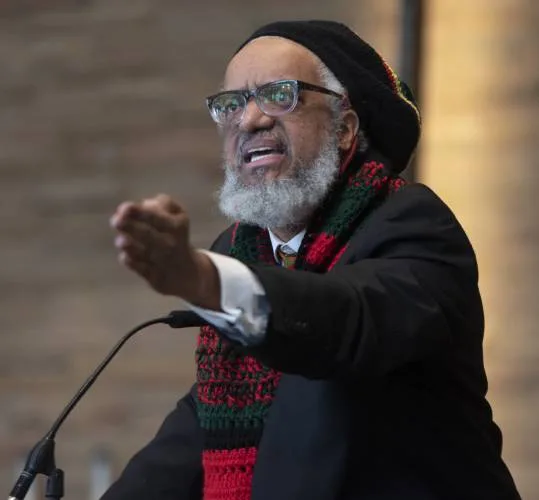
UMass Professor Amilcar Shabazz, secretary of the Black Business Association of Amherst Area, is seen at the 36th annual MLK day celebration in Northampton in January 2020.
STAFF FILE PHOTO
AMHERST — A Black-owned business organization is continuing its campaign to elicit financial support from the town, including money that it claims was unfairly withheld from those who run shops in town and needed the funds to recover from the pandemic.
“We don’t benefit from the resources from our town,” Pat Ononibaku, president of the Black Business Association of Amherst Area, said during a gathering at BakuCare in Hadley on Friday afternoon.
The meeting of eight members of the organization at Ononibaku’s adult care business came a few days after the March 18 Town Council meeting in which it made appeals for $1.5 million in American Rescue Plan Act funding, with $650,000 to go directly to under-resourced Black residents, $400,000 as direct capital to support Black-owned businesses, $125,000 to support staffing needs for the business group and $45,000 for job readiness training and culturally sensitive programming for Black youth.
The group learned earlier in the week that Town Manager Paul Bockelman, who controls the allocation of American Rescue Plan Act money, is expected to direct the remaining $3.8 million in the account for other purposes, including renovations to the Bangs Community Center, a solar canopy at Fort River School and town roads and sidewalks.
As a continuing initiative, Ononibaku said what she is seeing is that ARPA money has been doled out to already well-to-do people, rather than those most in need.
“We feel invisible, disrespected and discriminated against,” Ononibaku said, reiterating a call she and the organization are making for Bockelman to resign over “illegal and unjust” allocation of ARPA money.
Bockelman has said previously that the $11.9 million in ARPA money received by the town has been used to benefit a wide swath of residents, with diversity, equity and inclusion a major factor in decisions supporting businesses, along with efforts underway to create a youth empowerment center.
Ononibaku, though, said a half dozen members of the organization applied and were denied relief money, including Yasmin Brandford, who runs Amherst Extensions & Beauty Salon in South Amherst. Amherst Media, the nonprofit with a board made up of a majority of Black, Indigenous and people of color individuals, asked for $250,000, but didn’t receive it.
Brandford said the decisions to deny her request for relief were “very unfair” and “very unjust.” “I think they knew what they would do with the money even before I applied,” Brandford said.
“We’re not going to stop fighting,” Brandford said.
Two start-up Black-owned businesses, Carefree Cakery in the Mill District and White Lion Brewery in Amherst center, did get ARPA money, $13,000 in total, but Ononibaku said that their being located in prominent Amherst property owner’s buildings was likely a factor in their successful applications.
Ononibaku said she runs both home care and clothing businesses from Amherst, but is not looking for a handout. “It’s not about me, but it’s my community that is hurting,” Ononibaku said.
Amilcar Shabazz, secretary for the Black business association, said the spirit of ARPA is to help those hurt by the pandemic and who have a deep impact on the community, including people like Brandford.
While she has been able to continue serving her hometown, there is concern that if she and others close up shop, it will impact all Black residents.
Some of the focus of the frustrations for the Black business association continues to be on The Drake, which is licensed as a nightclub and which Ononibaku refers to as a “wealthy, white entity,” while Hazel’s Blue Lagoon, a Black-owned nightclub, closed. Shabazz blamed its failure on “roadblocks” placed intentionally to delay its opening.
“This is the kind of hostile environment Black businesses face,” Shabazz said.
Shabazz said he compliments Bockelman for launching the Community Responders for Equity, Safety and Service and Diversity, Equity and Inclusion departments, and has no joy in calling him out on the ARPA money.
“We grant all of that, but that is not reparations — that is not reparative justice,” Shabazz said.
Without support from the town for Black businesses, he said, Black families are less likely to live in Amherst. When Shabazz arrived at the University of Massachusetts to teach, his family found Amherst appealing due to the presence of Black-owned businesses, like Ononibaku’s former restaurant that served African cuisine.
“When we lose these kinds of connections, people who could be attracted here also won’t come,” Shabazz said.
Scott Merzbach can be reached at smerzbach@gazettenet.com.
More News for you
By using this site, you agree with our use of cookies to personalize your experience, measure ads and monitor how our site works to improve it for our users
Copyright © 2016 to 2024 by H.S. Gere & Sons, Inc. All rights reserved.




